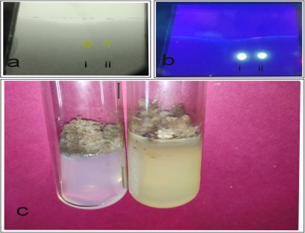Abstract
Callus cultures were raised from young green leaf segments of the medicinal climber Tinospora cordifolia in Murashige and Skoog’s media containing different growth regulator regime. The in vitro callus cultures were analysed for the accumulation of active principle through high-performance liquid chromatography. Quantitative analysis of berberine was achieved by thin-layer chromatography and UV-absorbance method. Callus cultures accumulated an appreciable amount of berberine. A maximum of 355 μg/g dry wt accumulation of berberine was noted when the callus was grown in the presence of 2 mg/l 2, 4-D and 0.1 mg/l BA. However, maximum callus growth was achieved in the presence of 0.5 mg/l BA and 2 mg/l 2,4-D. Maximum tissue growth didn't favour an increased accumulation of the berberine. Enhanced accumulation of berberine was found when callus growth was less and therefore may be associated with the stress faced by in vitro tissues. The experimental results indicate that it is desirable to adopt two different growth regulator regime - one for accelerated callus growth and another for enhanced in vitro synthesis of berberine. The in vitro cultures of T. cordfiolia also offers an ideal system for understanding the studies on elucidating alternate routes of berberine biosynthetic pathway as well as possible elite cells for scaling up of berberine.
Full text article
Authors

This work is licensed under a Creative Commons Attribution-NonCommercial-NoDerivatives 4.0 International License.

